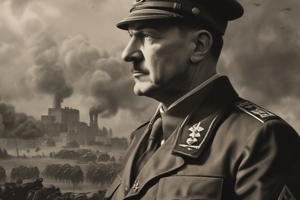Podcast
Questions and Answers
The Treaty of Versailles imposed light reparations on Germany after World War I.
The Treaty of Versailles imposed light reparations on Germany after World War I.
False (B)
The Great Depression of 1929 had no impact on political movements in Germany or Italy.
The Great Depression of 1929 had no impact on political movements in Germany or Italy.
False (B)
Mussolini's regime in Italy was characterized by a rise in communism.
Mussolini's regime in Italy was characterized by a rise in communism.
False (B)
Germany annexed Austria in 1938 as part of its expansionist policies.
Germany annexed Austria in 1938 as part of its expansionist policies.
The League of Nations effectively enforced collective security to prevent aggression in the 1930s.
The League of Nations effectively enforced collective security to prevent aggression in the 1930s.
The policy of appeasement aimed to provoke further aggression from Hitler.
The policy of appeasement aimed to provoke further aggression from Hitler.
The Non-Aggression Pact allowed Germany to invade Poland without fearing a Soviet response.
The Non-Aggression Pact allowed Germany to invade Poland without fearing a Soviet response.
Britain and France declared war on Germany after it invaded Poland on September 1, 1939.
Britain and France declared war on Germany after it invaded Poland on September 1, 1939.
Japan began its expansionist policies after World War II.
Japan began its expansionist policies after World War II.
Totalitarian regimes in Germany and Italy promoted democracy in the 1930s.
Totalitarian regimes in Germany and Italy promoted democracy in the 1930s.
Flashcards are hidden until you start studying
Study Notes
Causes Of World War 2
-
Treaty of Versailles (1919)
- Imposed heavy reparations on Germany after World War I.
- Territorial losses and military restrictions bred resentment.
- Contributed to economic instability in Germany.
-
Economic Factors
- Global Great Depression (1929) led to widespread unemployment and poverty.
- Economic instability fueled extremist political movements, particularly in Germany and Italy.
-
Rise of Totalitarian Regimes
- Emergence of fascism in Italy under Mussolini.
- Hitler's Nazi regime in Germany, promoting nationalism and militarism.
- Expansionist policies aimed at territorial conquest.
-
Expansionist Policies
- Japan sought to expand its empire in East Asia, leading to invasions of Manchuria (1931) and China (1937).
- Germany's annexation of Austria (Anschluss, 1938) and occupation of Czechoslovakia (Munich Agreement, 1938).
-
Failure of the League of Nations
- Ineffective in preventing aggression; unable to enforce collective security.
- Failure to respond to acts of aggression, including Japan's invasion of Manchuria and Italy's invasion of Ethiopia.
-
Appeasement Policy
- Britain and France adopted a policy of appeasement towards Hitler, allowing for territorial expansion in hopes of avoiding conflict.
- Munich Agreement (1938) exemplified this approach, permitting German annexation of Sudetenland.
-
Non-Aggression Pact (1939)
- Agreement between Germany and the Soviet Union to invade Poland.
- Allowed Germany to invade Poland without fear of Soviet intervention.
-
Immediate Trigger
- Invasion of Poland by Germany on September 1, 1939.
- Britain and France declared war on Germany in response, marking the official start of World War 2.
Causes of World War 2
- The Treaty of Versailles imposed heavy reparations on Germany, leading to resentment and economic instability.
- The global Great Depression in 1929 resulted in widespread unemployment and extreme poverty, paving the way for extremist movements.
- Fascism rose in Italy under Mussolini, while Hitler's Nazi regime in Germany emphasized nationalism and militarism.
- Japan sought empire expansion in East Asia, initiating invasions of Manchuria in 1931 and China in 1937.
- Germany's aggressive actions included the annexation of Austria (Anschluss, 1938) and occupation of Czechoslovakia via the Munich Agreement.
- The League of Nations failed to prevent aggression, lacking the power to enforce collective security.
- Major aggressions went unchecked, including Japan's invasion of Manchuria and Italy's invasion of Ethiopia, highlighting the League's ineffectiveness.
- The appeasement policy adopted by Britain and France allowed Hitler to expand territorially with the hope of avoiding conflict.
- The Munich Agreement in 1938 exemplified appeasement by permitting German annexation of Sudetenland.
- The Non-Aggression Pact signed in 1939 between Germany and the Soviet Union allowed Germany to invade Poland without fearing Soviet intervention.
- The immediate trigger for World War 2 was Germany's invasion of Poland on September 1, 1939.
- In response to Poland's invasion, Britain and France declared war on Germany, marking the official beginning of World War 2.
Studying That Suits You
Use AI to generate personalized quizzes and flashcards to suit your learning preferences.




